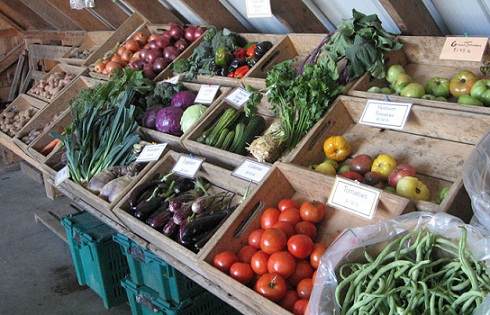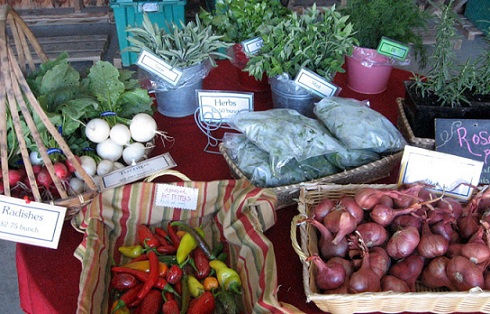Making the Most of Your Farmers’ Market
Farmers’ markets are a public food market at which local food growers sell fresh fruit and vegetables directly to consumers. Farmers’ Markets can vary in size and what they sell. A lot of things grow with a trip to the local market. Your savings grow. Your budget stretches. New ideas for meals bloom. Your nutritional intake moves forward by leaps and bounds. So what is not to like?
What is at a farmers’ market depends on a combination of location, season, and market rules about what can be sold. Many farmers markets only carry locally-grown, locally-made and/or locally-processed, foods, and create a system of guidelines that ensure vendors are producing what they are selling. Others have more flexible policies. The great thing about farmers markets is that if you are ever unsure about what a product is, where it came from, or how it was grown, you can just ask! – source Farmers Market Coalition
Heading out to the farmer’s market can be a bit intimidating if you are used to only shopping at the grocery store. A bit of organization on your part can help you really enjoy the experience.
Do not Plan Ahead – While a weekly menu and grocery plan is a must to stay on budget and be organized, do not worry about that prior to your farm market visit. Go without a list. Buy things that are in season, are a good price and look yummy to you. Once you’ve hauled in your load, then you can look at all your produce and plan some economical meals around it.
Take Containers – Grab those reusable grocery bags. If you have a cart with wheels, bring it. You will be happy you did when laden down with delicious watermelon, cantaloupe, onions, and other heavy items. I would also take a cooler with some freezer packs in it. Do not be surprised to see fresh eggs, milk, and butter at the market. You may find homemade cheeses and sausage. My niece even sells her organic gelato at farm markets.
Dress the Part – It is probably going to be hot out! Either head out early or wear cool clothing, sun block, and a hat. Take along a bottle of water.
Get Money – It is not the supermarket. Maybe they will take plastic, but probably not. Get some cash before the market.
Try New Things – The farmer probably grew lots of standard fruits and vegetables that you will recognize – load up on them. But, be open to trying some of the fun produce you do not recognize. This past week, we picked up a canary melon. I had to ask the name of the bright yellow fruit. If it can be eaten raw, they will usually give you a taste.
Ask Questions – I love to ask how they prepare the produce at home. Since they grow it, you know they are filling their table with it. Some of the best recipes I have cooked came from the folks behind the folding tables or from the bed of their pick-up. Not only do I do that with things that are new to me, but I will do that with familiar items to learn new ideas. Last weekend, I picked up some pink-eye peas. I asked “What else should I buy to go with these?” I left with a big sweet onion and three jalapeno chile peppers to add to the pot of peas. Some vendors have brochures and others have business cards with web addresses. You can visit the websites for their recipes.
Get Help – Not sure how to pick the ripest melon? Do not know how to decide from a giant pile of different types of tomatoes? Ask the grower. They will show you or even pick them out for you.
Be Aware of Your Budget – In-season produce is a bargain and never more so than directly from the grower. There are lots of temptations at a farm market, just like in the grocery store. You will find organic and gourmet products that can be costly. They are wonderful to enjoy but may damage your grocery budget. Go easy on buying cookies, cakes, salad dressings, and other wonderful goodies unless you can stretch your budget to do so. Buying in bulk gets you the best deal, but only if you know what to do with it and have the time to do so. If you know how to can, preserve, or freeze produce, and you are not busy, then go ahead. If not, do not yield to the temptation as the waste of spoiled produce will offset any savings.
Wash and Store – Be sure to refrigerate your produce promptly. Remember that farm market produce has usually not been through any commercial washing processes. So just like always, be sure to wash everything before you eat it. Be sure to wash your own hands after handling all the produce to remove any trace bits of fertilizer or chemicals.
 Author Lea Schneider, a columnist for What’s Cooking America, is a freelance writer and organizational expert whose organizing ideas have been published in many magazines including Woman’s Day, Better Homes and Gardens Kitchen and Bath Ideas, Family Circle, Parents Magazine, as well as numerous newspapers and websites. She is a member of the Association of Food Journalists.
Author Lea Schneider, a columnist for What’s Cooking America, is a freelance writer and organizational expert whose organizing ideas have been published in many magazines including Woman’s Day, Better Homes and Gardens Kitchen and Bath Ideas, Family Circle, Parents Magazine, as well as numerous newspapers and websites. She is a member of the Association of Food Journalists.
Getting organized is all about living simpler and making things easier. The bonus is it often leads to saving money. Lea Schneider’s kitchen organizing columns tell you how to organize the many things that relate to kitchens, menus, meals, and special food events.
Check out all of Lea Schneider’s helpful home and kitchen columns at Organizing Kitchens, Pantries, Menus and Meals.


